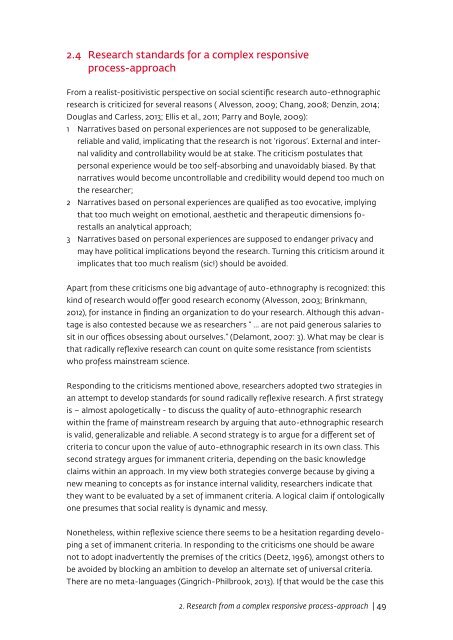Rumbling on performativity_Frits Simon
Rumbling on performativity_Frits Simon
Rumbling on performativity_Frits Simon
Create successful ePaper yourself
Turn your PDF publications into a flip-book with our unique Google optimized e-Paper software.
2.4 Research standards for a complex resp<strong>on</strong>sive<br />
process-approach<br />
From a realist-positivistic perspective <strong>on</strong> social scientific research auto-ethnographic<br />
research is criticized for several reas<strong>on</strong>s ( Alvess<strong>on</strong>, 2009; Chang, 2008; Denzin, 2014;<br />
Douglas and Carless, 2013; Ellis et al., 2011; Parry and Boyle, 2009):<br />
1 Narratives based <strong>on</strong> pers<strong>on</strong>al experiences are not supposed to be generalizable,<br />
reliable and valid, implicating that the research is not ‘rigorous’. External and internal<br />
validity and c<strong>on</strong>trollability would be at stake. The criticism postulates that<br />
pers<strong>on</strong>al experience would be too self-absorbing and unavoidably biased. By that<br />
narratives would become unc<strong>on</strong>trollable and credibility would depend too much <strong>on</strong><br />
the researcher;<br />
2 Narratives based <strong>on</strong> pers<strong>on</strong>al experiences are qualified as too evocative, implying<br />
that too much weight <strong>on</strong> emoti<strong>on</strong>al, aesthetic and therapeutic dimensi<strong>on</strong>s forestalls<br />
an analytical approach;<br />
3 Narratives based <strong>on</strong> pers<strong>on</strong>al experiences are supposed to endanger privacy and<br />
may have political implicati<strong>on</strong>s bey<strong>on</strong>d the research. Turning this criticism around it<br />
implicates that too much realism (sic!) should be avoided.<br />
Apart from these criticisms <strong>on</strong>e big advantage of auto-ethnography is recognized: this<br />
kind of research would offer good research ec<strong>on</strong>omy (Alvess<strong>on</strong>, 2003; Brinkmann,<br />
2012), for instance in finding an organizati<strong>on</strong> to do your research. Although this advantage<br />
is also c<strong>on</strong>tested because we as researchers “ ... are not paid generous salaries to<br />
sit in our offices obsessing about ourselves.” (Delam<strong>on</strong>t, 2007: 3). What may be clear is<br />
that radically reflexive research can count <strong>on</strong> quite some resistance from scientists<br />
who profess mainstream science.<br />
Resp<strong>on</strong>ding to the criticisms menti<strong>on</strong>ed above, researchers adopted two strategies in<br />
an attempt to develop standards for sound radically reflexive research. A first strategy<br />
is – almost apologetically - to discuss the quality of auto-ethnographic research<br />
within the frame of mainstream research by arguing that auto-ethnographic research<br />
is valid, generalizable and reliable. A sec<strong>on</strong>d strategy is to argue for a different set of<br />
criteria to c<strong>on</strong>cur up<strong>on</strong> the value of auto-ethnographic research in its own class. This<br />
sec<strong>on</strong>d strategy argues for immanent criteria, depending <strong>on</strong> the basic knowledge<br />
claims within an approach. In my view both strategies c<strong>on</strong>verge because by giving a<br />
new meaning to c<strong>on</strong>cepts as for instance internal validity, researchers indicate that<br />
they want to be evaluated by a set of immanent criteria. A logical claim if <strong>on</strong>tologically<br />
<strong>on</strong>e presumes that social reality is dynamic and messy.<br />
N<strong>on</strong>etheless, within reflexive science there seems to be a hesitati<strong>on</strong> regarding developing<br />
a set of immanent criteria. In resp<strong>on</strong>ding to the criticisms <strong>on</strong>e should be aware<br />
not to adopt inadvertently the premises of the critics (Deetz, 1996), am<strong>on</strong>gst others to<br />
be avoided by blocking an ambiti<strong>on</strong> to develop an alternate set of universal criteria.<br />
There are no meta-languages (Gingrich-Philbrook, 2013). If that would be the case this<br />
2. Research from a complex resp<strong>on</strong>sive process-approach | 49



